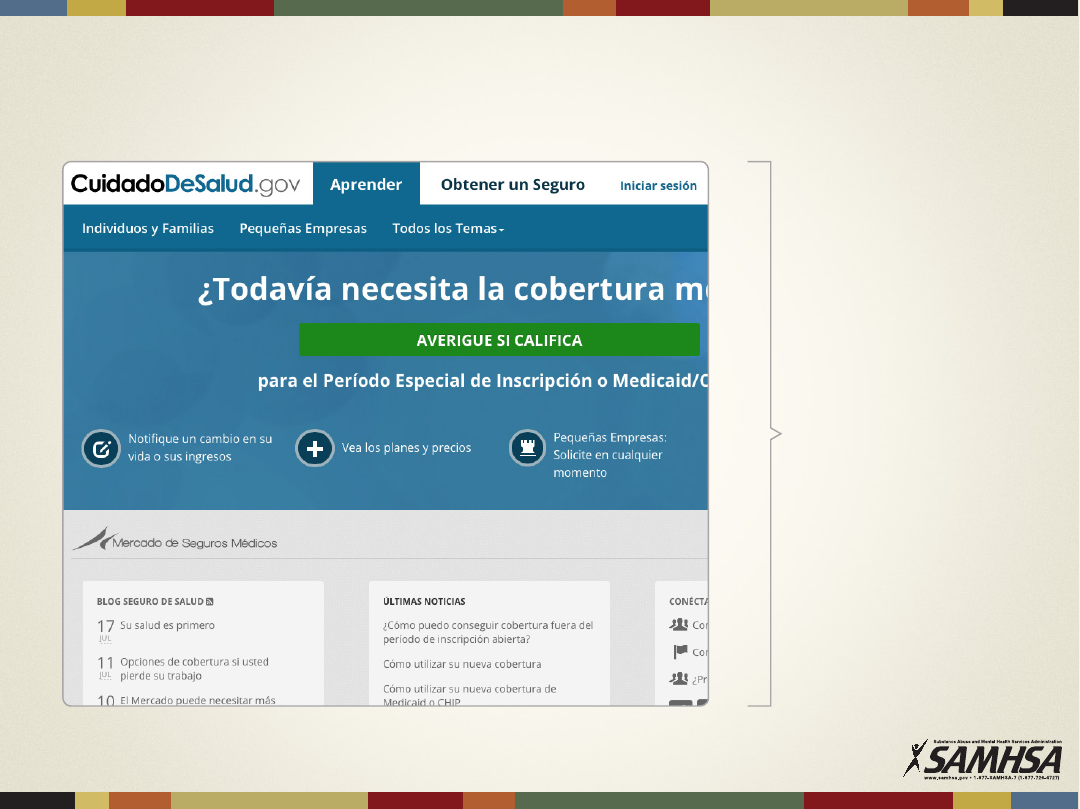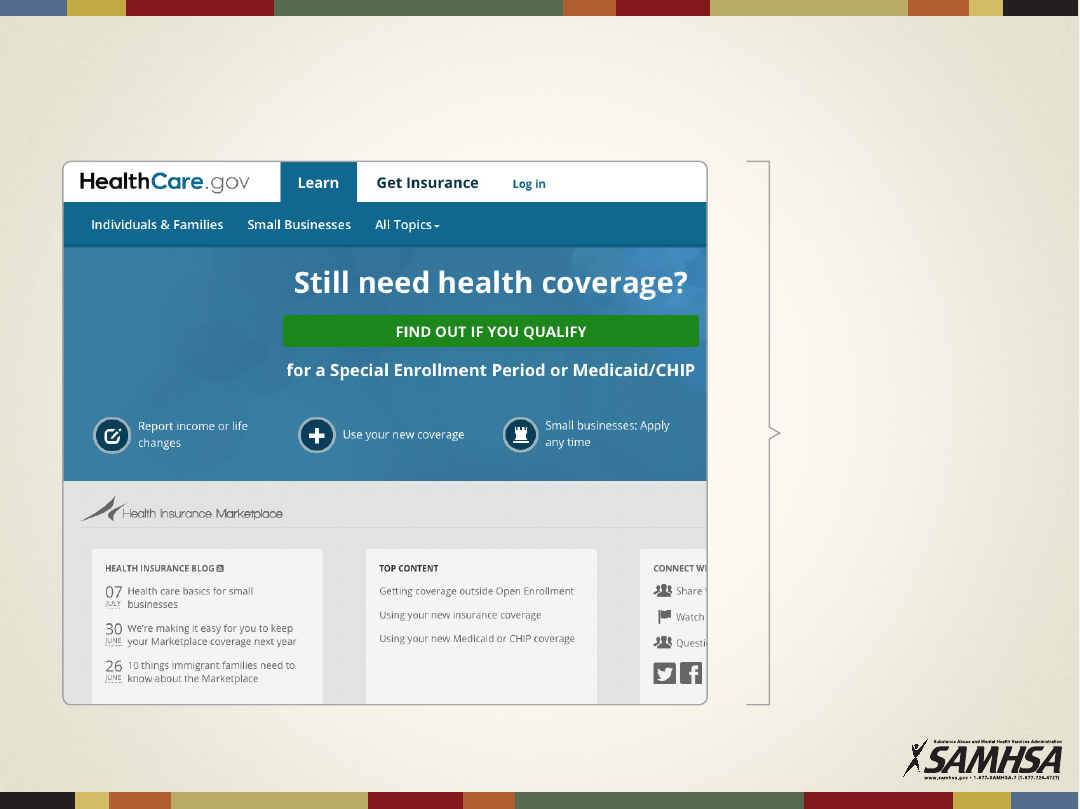
What immigrants and refugees need to know
about the Aordable Care Act (ACA)
1

2
Getting health insurance that you can afford is important. Thanks to the ACA, you can get health coverage to
help keep you and your family healthy. The ACA is sometimes called “Obamacare.” If you are an immigrant or
refugee, there are some things about the ACA you need to know.
The ACA helps people get health insurance through the Health Insurance Marketplace. We will talk about why
you need health insurance coverage, your eligibility for health coverage, and how to enroll in health coverage.
Aordable Care Act (ACA)
It is sometimes called Obamacare
Why do you need health insurance coverage?
Are you eligible for health coverage?
How do you enroll in health coverage?
2

3
Enrolling in quality health insurance for you and your family is critical to your success! Health is important, and emotional
and mental wellbeing are part of our overall health. Adults with serious mental health challenges are more likely to have
asthma, high blood pressure and diabetes. Having health insurance makes it easier for you and your family to get and
stay healthy. If you are physically, emotionally, mentally and spiritually healthy, you can be a positive part of your family,
friends and community.
No one plans to get sick or hurt, but most people need medical care at some point. People without health insurance are
more likely to use the emergency room. Using the emergency room for non-life threatening issues can be expensive.
Health insurance helps cover these costs and protects you from very high expenses.
Why is health insurance important?
Having health insurance makes it easier for you and your family to get and stay healthy
Check-up Hospital Counseling
Prescriptions Flu Shots Depressi
on Screening
3

4
Health insurance helps you get access to affordable, quality health care for your physical and mental health needs, and
can also help with substance abuse services. Health insurance is a contract between you and your insurance company.
You buy a plan, and the company agrees to pay part of your medical costs when you get sick or hurt. You can shop
for health insurance plans in the Health Insurance Marketplace, and nd a plan that meets the needs of you and your
family. Each state is different so depending on where you live, you will have access to different insurance plans.
If you don’t have health insurance, you may have to pay a fee. The fee is also called the “penalty,” “ne,” or “individual
shared responsibility payment.” The fee is calculated based on a percentage of your household income or a at rate per
person, whichever is higher.
What does health insurance do?
It helps you get access to quality health care
Physical Health Mental Health Substance Abuse
4

5
You might be worried about enrolling because the application is hard to complete or you might be confused about
eligibility. You might also be worried about immigration enforcement, especially if people in your family have different
immigration statuses, and if you might expose other family members to the risk of deportation. If you work in seasonal
jobs, are paid in cash or travel or move a lot, if might have been hard for you to renew your coverage.
If you don’t speak or read English well, the forms and notices might be hard to understand. You might also be unable to
enroll online because you don’t have a computer or know how to use a computer well. You and your family might have
also had a hard time getting health care, because of transportation and language barriers.
Concerns about enrollment
Major barriers
· Difficulty completing application
· Confusion about eligibility
· Fear about immigration enforcement
· Language and literacy challenges
· Renewing your coverage
5

6
While there are many barriers for immigrants and refugees and their families, the ACA and Marketplace make it easier
to get health insurance and health care. The Marketplace is where you can nd private insurance plans and get help
paying for insurance.
There are some things you need to know about eligibility. In order to get private health insurance through the Market-
place, you must be a U.S. citizen or be lawfully present in the United States. The term “lawfully present” includes individ-
uals who have “qualied non-citizen” immigration status without a waiting period, humanitarian statuses or circumstanc-
es or valid non-immigrant visas. There are other kinds of lawfully present individuals listed above.
To get insurance
You need to meet these requirements
Be a U.S. citizen or be lawfully present in the United States
“Lawfully present” individuals have:
· Qualified non-citizen status without a waiting period
· Humanitarian statuses or circumstances
· Valid non-immigrant visa
· Legal Status conferred by other laws
6

7
Qualied non-citizens include lawful permanent residents, like green card holders, asylees and refugees. Other
qualied non-citizens are listed above.
Qualied non-citizens
You can get insurance on the Marketplace
· Lawful Permanent Residents (LPR/Green Card Holder)
· Asylees
· Refugees
· Cuban/Haitian entrants
· Paroled into the U.S. for at least one year
· Conditional entrant granted before 1980
· Battered non-citizens, spouses, children, or parents
· Victims of trafficking
· Granted withholding of deportation
· Member of a federally recognized Indian tribe or American Indian born in Canada
7

8
If you’re a lawfully present individual, you can get private health insurance on the Marketplace. You might be able to get
help paying for insurance too. You may be eligible for lower costs on monthly premiums and lower out-of-pocket costs
if your annual income is 400% of the federal poverty level or below or if your annual household income is below 100%
federal poverty level.
The federal poverty level, or FPL, is a measure of income level issued each year by the Department of Health and
Human Services to determine your eligibility for certain programs and benets.
Lawfully present individuals with estimated household incomes of up to 400% of the FPL in 2014 may be eligible for tax
credits. The tax credit can be used immediately to reduce monthly premiums for insurance bought in the Marketplace.
400% of the FPL is about $45,960 for an individual or $94,200 for a family of 4 according to the 2013 Poverty
Guidelines.
If you are a lawfully present individual with an estimated household income under 100% of the FPL in 2014 and not
eligible for Medicaid, you will be eligible for tax credits and lower out-of-pocket costs for private insurance through the
Marketplace when all other eligibility requirements are met. 100% of the FPL in 2014 is about $11,490 for an individual
or $23,550 for a family of 4.
You may qualify for government help
Paying for health insurance
Federal Poverty level
$11,490
$94,200$50,000
Single
$11,490 – $45,960
Family of 4
$23,550 – $94,200
The amount of tax credits and cost-sharing reductions you get
depends on how much money you make.
8

9
When you have insurance, you pay some costs and your insurance plan pays some others.
Each month, you pay what’s called a premium to have health insurance, even if you do not use any health care services.
Once you’ve paid your premium, most plans help pay for the costs of doctor visits and drugs – you only pay a small
portion or xed amount called a co-pay. Your insurance company won’t pay anything until you use enough health care
services each year to reach what is called a deductible. After that, your plan will cover most of your costs for you, and
you will pay a small percentage called co-insurance.
This amount varies depending on the plan you choose, but a typical plan might cover 80 percent of the costs once you
meet a deductible and you will only pay 20 percent. Usually, you pay a lower monthly premium if you have a higher
deductible. So if you think you and your family will use a lot of health care in a given year, you want a plan with a higher
monthly cost, because it will have a lower overall cost when you add up all of your treatments and medicines.
Out-of-pocket maximum is the most you pay during a policy period, which is usually one year, before your health
insurance or plan starts to pay 100% for covered essential health benets.
The maximum out-of-pocket cost limit for any individual Marketplace plan for 2014 can be no more than $6,350 for an
individual plan and $12,700 for a family plan.
Health insurance words
The most important words are premiums, co-pays, deductibles, co-insurance and out-of-pocket
Premium
Each month, you pay what’s called a premium to have health insurance, even if
you do not use any health care services.
Co-pay
Once you’ve paid your premium, most plans help pay for the costs of doctor
visits and drugs – only making you pay a small portion or fixed amount.
Deductible
It’s the portion you have to pay before the insurance company covers anything.
Co-i
nsurance
After you have met your deducible
, the amount or percent that you have -
usually 20%.
Out-of-pocket
maximum
It’s the most you pay during a policy period (usually one year) before your
health insurance plan starts to pay.
9

10
Each insurance plan sold in the Marketplace offers 10 of the most important health services that you may need. They
are called Essential Health Benets and they include:
• Outpatient care—the kind you get without being admitted to a hospital
• Emergency services. This is for life threatening problems only. If you show up in the emergency room and your
problem is not that serious, your insurance might not cover it.
• Hospitalization, such as surgery. This is when you are admitted and you get treatment in the hospital for inpatient
care.
• Maternity care for you before and after your baby is born, and care for your baby
• Mental health and substance use services, including counseling and psychotherapy
• Prescription medicines
• Health care services that help a person keep, learn or improve skills and functioning for daily living. This may
include therapy for a child who isn’t walking or talking at the expected age, physical and occupational therapy,
speech-language pathology and other services for people with disabilities.
• Lab services, such as having your cholesterol checked or having a tissue biopsy
• Preventive and wellness services and chronic disease management, such as education about how to manage your
diabetes
• Dental and vision care for kids
For even more details about your plan, take a look at your Summary of Benets and Coverage.
What does your plan cover?
10 essential health benefits in every Marketplace plan
Outpatient
Care
Emergency
Services
Hospital
Baby Care
Mental Health
Sub
stance Abuse
Prescri
ptions
Disability
Care
Lab Tests
Preventive
Servi
ces
Dental and
Vision for Kids
10

11
Now let’s talk about other health insurance programs offered by the government. If you are a qualied non-citizen, you
are generally eligible for Medicaid and Children’s Health Insurance Program coverage if you meet your state’s income
eligibility rules. The Children’s Health Insurance Program, or CHIP, is a health insurance program for children up to age
19. Medicaid is a health insurance program for low-income families and children, pregnant women, the elderly, people
with disabilities, and in some states, other adults. Medicaid programs vary state by state. Medicaid may have a different
name in your state.
To get Medicaid and CHIP coverage, you may have a 5-year waiting period. This means you must wait 5 years after
receiving “qualied” immigration status before being eligible for Medicaid and CHIP. Some states have removed the
5-year waiting period. People who don’t have eligible immigration status are not eligible for Medicaid. However, they
may be able to get limited emergency services through Medicaid if they meet all other Medicaid eligibility criteria in the
state.
You can enroll in Medicaid or CHIP any time during the year. If you qualify, you can enroll now.
Medicaid and CHIP
Other programs available
Medicaid
Medicaid is a health insurance program for
low-income families and children, pregnant
women, the elderly, people with disabilities,
and in some states, other adults
CHIP
The Children’s Health Insurance Program,
or CHIP, is a health insurance program for
children up to age 19
11

12
Federal and state Marketplaces, and state Medicaid and CHIP agencies can’t require you to provide information about
the citizenship or immigration status of any family or household members who aren’t applying for coverage. States
can’t deny you benets because a family or household member who isn’t applying hasn’t provided his or her citizenship
or immigration status. Information that you provide to the Marketplace won’t be used for immigration enforcement
purposes.
Applying for Medicaid or CHIP, or getting help with health insurance costs in the Marketplace, will not affect your
chances of becoming a Lawful Permanent Resident or U.S. citizen. The one exception is for people receiving long-term
care in an institution at government expense. These people may face barriers getting a green card.
Your immigration status
It won’t be used for immigration enforcement purposes
1
Can’t require you to provide information about the
citizenship or immigration status of any family or
household members who aren’t applying for coverage
2
States can’t deny you benefits because a family or
household member who isn’t applying hasn’t provided
immigration status
3
Applying for health insurance will not affect your
chances of becoming a Lawful Permanent Resident
or U.S. citizen
12

13
There are some specic things you need to know about the ACA if you are part of a certain group.
A mixed-status family is made up of individuals with different citizenship or immigration statuses, For example, an
undocumented mother, a lawfully present father, an adolescent granted Deferred Action for Childhood Arrivals, or DACA,
program, and a child who is a U.S. citizen because he or she was born in the United States. Remember, you can only
get insurance through the Marketplace if you are lawfully present in the United States.
That means undocumented immigrants and DACA recipients generally can’t get insurance through the Marketplace,
Medicaid and CHIP, but may be eligible for emergency Medicaid or state-funded programs.
Some states have removed the 5-year waiting period and cover lawfully residing children and/or pregnant women
who are otherwise eligible for Medicaid.
If you are a Compact of Free Association migrant, meaning you are from the Federated States of Micronesia, the
Republic of the Marshall Islands or the Republic of Palau, you are considered a lawfully present non-citizen and can get
private insurance through the Marketplace. However, you are not eligible for Medicaid or CHIP.
continued on next page »
Special cases
Your eligibility varies depending on your status
Mixed status
families
Only lawfully present individuals are eligible
Pregnant women
and children
Lawfully residing immigrant children under age 21 and
pregnant women are eligible in some states
COFA
mi
grants
Eligible for Marketplace plans, not eligible for Medicaid or CHIP
DACA
i
ndividuals
Not eligible for Mark
etplace, Medicaid or CHIP
Undocumented
individuals
Not eligible for Marketplace, Medicaid or CHIP
13
Deferred Action of Childhood Arrivals, or DACA,-eligible individuals are not eligible for insurance coverage through the
Marketplace, Medicaid or CHIP. Unless their state has established a state-funded health coverage program, their only
opportunity to obtain affordable health insurance may be through employment. DACA-eligible individuals also do not
need to pay the penalty if they don’t have health insurance.
Undocumented immigrants also can’t get insurance through the Marketplace, Medicaid, CHIP, and don’t have to pay
the penalty if they don’t have health insurance.
Undocumented immigrants may continue to buy coverage on their own outside the Marketplace and can get limited
services for an emergency medical condition through Medicaid, if they are otherwise eligible for Medicaid in the state.
If you’re not eligible for Marketplace coverage or you can’t afford a health plan, you can get low-cost health care at
a nearby community health center. Community health centers provide primary health care services to all residents,
including immigrant families, in the health center’s service area. Some states provide insurance coverage to additional
immigrant populations. Check with your state Medicaid ofce to see if you qualify.
14

15
Now let’s talk about how to get health insurance. Remember, you can enroll in Medicaid or CHIP any time. You can only
enroll in a Marketplace plan during open enrollment periods, which are generally 3 months long and begin in the fall.
You can get more information about the ACA and health insurance at www.healthcare.gov, the ofcial website of the
Health Insurance Marketplace. You can shop for health plans, apply and enroll online at healthcare.gov.
You can also call the toll free number 1-800-318-2596 to start or nish an application, compare plans, enroll or ask a
question 24 hours a day, 7 days a week. Assistance is available in more than 150 different languages.
You can also enroll with the help of a person or organization that is certied to help you enroll. These people may be
call in-person assisters or navigators. Local state welfare ofces, community health centers, local hospitals, mental
health centers, immigration centers and consulate ofces may also be able to provide information about ACA programs
in your state. You can also contact your local church or a faith based agency, local libraries, county health ofces,
income tax preparation ofce, Head Start center or school staff for more help about health insurance.
How to get health insurance
There are 4 ways to enroll
Online
Go online to
Phone
Call 1-800-318-2596
Mai
l
F
ill out a paper application and mail it in
Get Help
Find an ‘assister’ at any of these places and schedule an appointment, or call
1-800-318-2596 and ask how to get in-person help.
15

16
If you need help in another language, you can get it. HealthCare.gov is available in English and Spanish. You can go
to CuidadodeSalud.gov, or click “Español” in the upper right hand corner on the healthcare.gov site.
A representative from the Marketplace Call Center can help you in your language. To talk to an interpreter, call 1-800-
318-2596 and say “Agent” or press “0”. Once an agent is on the line, say the name of the language you need.
Each state also has language assistance, but the way you request language assistance may be different in each state.
Any government agency or federally qualied health center has access to language line. This is a translator that is
available to help you in your language over the phone.
Language assistance
You can get help in your language
cuidadodesalud.gov
16

17
When you are ready to apply, make sure you have social security numbers for everyone in your household who is
applying for insurance. You also need income information, so you will need everyone’s pay stubs, W-2 forms, income
tax returns, or letters from Social Security, Supplemental Security Income, or the U.S. Department of Veteran’s Affairs.
You will also need documents to show your immigration status, like a green card or refugee travel document. If anyone
in your household has health insurance, you will need the policy number.
Remember, Health Insurance Marketplaces and state Medicaid and CHIP agencies can only require Social Security
Numbers from applicants, recipients of benets, and certain people whose income is needed for computing tax credits.
States can ask other non-applicants for a social security number, but only if they clearly indicate that providing this
information is voluntary, and if they explain how the information will be used. States can’t deny benets because the
applicant doesn’t provide the social security numbers of people who aren’t applicants for benets or recipients of
Medicaid or CHIP benets, or those not required to provide social security numbers.
Application process
What you will need to apply
For every person in your house (which is defined by how you file your income tax return)
who needs coverage, you must have their:
Proof of Residence Pay Stubs & Tax Forms Other Insurance
17

18
After you enroll in a health insurance plan, you will receive conrmation by mail or email. You will also receive
instructions on next steps, including paying your premium. A premium is the monthly cost of the insurance, IF you have
to pay one. Many people will not pay anything and some, just a small amount. You may also be contacted by phone
and/or mail by your state Medicaid or CHIP agency. Remember, Medicaid and CHIP may have a different name in your
state. Once your premium is paid, if you have one, than your health insurance cards will come in the mail.
If you are not sure if you have enrolled, you can check your account on healthcare.gov if you created one, you can call
the insurance company, or you can call the Marketplace Call Center at 1-800-318-2596.
We hope you understand why health insurance is important and what the ACA means for you and your family.
Remember, you can nd more information about the Affordable Care Act and health insurance at the Health Insurance
Marketplace website www.HealthCare.gov. You can also call the Marketplace Call Center at 1-800-318-2596 to ask a
question. The call center is open 24 hours a day, 7 days a week.
Thank you.
Where can I go for more information?
Health Insurance Marketplace
HealthCare.gov
1-800-318-2596
Information is available in
additional languages
18
